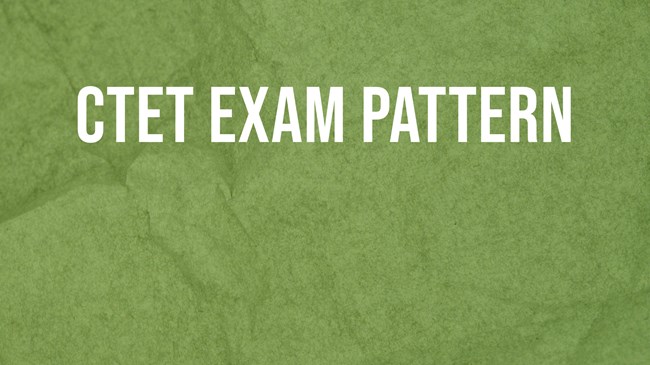CTET Exam Pattern
CTET Exam Pattern
The Central Teacher Eligibility Test (CTET) is an important examination for individuals aspiring to become teachers in central government schools in India. Conducted by the Central Board of Secondary Education (CBSE), CTET ensures the eligibility of candidates for teaching positions in primary and upper primary levels. To succeed in the CTET exam, it is essential to have a clear understanding of its pattern and structure. In this article, we will explore the CTET exam pattern in detail and provide valuable insights to help you prepare effectively.
 |
| CTET Exam Pattern |
Article Outline
- Introduction
- Understanding the CTET Exam
- Purpose of CTET
- Eligibility Criteria
- CTET Exam Pattern
- Structure of CTET Paper 1
- Sections and Marks Distribution
- Duration and Timing
- Structure of CTET Paper 2
- Sections and Marks Distribution
- Duration and Timing
- Marking Scheme
- Structure of CTET Paper 1
- Syllabus for CTET Exam
- Paper 1 Syllabus
- Paper 2 Syllabus
- Preparation Tips for CTET Exam
- Understand the Syllabus
- Create a Study Plan
- Refer to Quality Study Material
- Practice Previous Year Question Papers
- Take Mock Tests
- Focus on Weak Areas
- CTET Exam Day Guidelines
- Carry the Admit Card
- Reach the Exam Center on Time
- Follow the Instructions
- Manage Time Effectively
- Benefits of CTET Certification
- Opportunities for Teaching Jobs
- Higher Salary Potential
- Professional Growth
- Conclusion
- FAQs
- Is CTET mandatory for teaching jobs?
- Can I apply for both Paper 1 and Paper 2 of CTET?
- How many times is the CTET exam conducted in a year?
- What is the passing criteria for CTET?
- Is there any age limit to appear for the CTET exam?
Understanding the CTET Exam
Before delving into the exam pattern, let’s briefly understand the purpose of the CTET and the eligibility criteria. The CTET aims to assess the teaching aptitude and knowledge of candidates who wish to pursue a career in teaching. It serves as a benchmark for quality in teacher recruitment and ensures that individuals with the required skills and knowledge are selected for teaching positions.
To be eligible for the CTET exam, candidates must possess a minimum educational qualification, which varies depending on the level of teaching they wish to pursue. For primary level teaching (classes 1 to 5), candidates should have completed their Senior Secondary (or its equivalent) with at least 50% marks and should have passed or appearing in the final year of a 2-year Diploma in Elementary Education. For upper primary level teaching (classes 6 to 8), a graduation degree is required, along with a 2-year Diploma in Elementary Education or a Bachelor’s degree in Education (B.Ed).
- What is CTET Paper 1 and 2
- When Will CTET Exam Result be Declared?
- When CTET exam will be held in 2023
- Where CTET is Applicable
- Where is CTET Exam Center?
CTET Exam Pattern
The CTET exam is conducted in two papers: Paper 1 and Paper 2. Paper 1 is for candidates who wish to teach classes 1 to 5, while Paper 2 is for those aspiring to teach classes 6 to 8. Candidates can also choose to appear for both papers if they meet the eligibility criteria for both levels.
Structure of CTET Paper 1
Paper 1 consists of five sections: Child Development and Pedagogy, Language I, Language II, Mathematics, and Environmental Studies. The marks distribution for each section is as follows:
- Child Development and Pedagogy: 30 marks
- Language I (compulsory): 30 marks
- Language II (compulsory): 30 marks
- Mathematics: 30 marks
- Environmental Studies: 30 marks
The total duration of the paper is 2 hours and 30 minutes, with a scheduled timing from 9:30 AM to 12:00 PM.
Structure of CTET Paper 2
Paper 2 also consists of five sections: Child Development and Pedagogy, Language I, Language II, Mathematics and Science (for Mathematics and Science teachers), and Social Studies/Social Science (for Social Studies/Social Science teachers). The marks distribution for each section is as follows:
- Child Development and Pedagogy: 30 marks
- Language I (compulsory): 30 marks
- Language II (compulsory): 30 marks
- Mathematics and Science (for Mathematics and Science teachers) or Social Studies/Social Science (for Social Studies/Social Science teachers): 60 marks
The total duration of the paper is 2 hours and 30 minutes, with a scheduled timing from 2:00 PM to 4:30 PM.
Marking Scheme
For both Paper 1 and Paper 2, each question carries one mark, and there is no negative marking for incorrect answers. It is important to note that the CTET certificate is awarded to candidates who secure a minimum of 60% marks in the exam. However, qualifying the CTET exam does not guarantee a teaching job; it is an eligibility criterion for teaching positions in central government schools.
Syllabus for CTET Exam
To prepare effectively for the CTET exam, candidates should have a thorough understanding of the syllabus. The CTET syllabus covers various topics related to child development, pedagogy, language proficiency, and subject-specific knowledge.
The syllabus for Paper 1 includes Child Development and Pedagogy, Language I (compulsory), Language II (compulsory), Mathematics, and Environmental Studies. On the other hand, the syllabus for Paper 2 includes Child Development and Pedagogy, Language I (compulsory), Language II (compulsory), Mathematics and Science (for Mathematics and Science teachers), and Social Studies/Social Science (for Social Studies/Social Science teachers).
Preparation Tips for CTET Exam
To excel in the CTET exam, it is crucial to adopt effective preparation strategies. Here are some valuable tips to help you in your preparation journey:
- Understand the Syllabus: Familiarize yourself with the CTET syllabus and create a study plan accordingly.
- Create a Study Plan: Develop a well-structured study plan that allocates sufficient time to each section of the exam.
- Refer to Quality Study Material: Use recommended books, online resources, and study materials that cover the entire CTET syllabus.
- Practice Previous Year Question Papers: Solve previous year question papers to understand the exam pattern and gain familiarity with the types of questions asked.
- Take Mock Tests: Regularly take mock tests to assess your preparation level, identify areas of improvement, and manage time effectively during the exam.
- Focus on Weak Areas: Identify your weak areas and dedicate additional time and effort to improve your understanding and performance in those areas.
CTET Exam Day Guidelines
On the day of the CTET exam, it is essential to adhere to certain guidelines to ensure a smooth experience. Here are some important guidelines to keep in mind:
- Carry the Admit Card: Make sure to carry a printout of your CTET admit card along with a valid photo ID proof.
- Reach the Exam Center on Time: Plan your commute in advance and reach the exam center well before the reporting time mentioned in the admit card.
- Follow the Instructions: Read the instructions provided in the question paper and follow them carefully during the exam.
- Manage Time Effectively: Allocate time wisely to each section and question to ensure that you complete the exam within the given duration.
Benefits of CTET Certification
Earning a CTET certification offers numerous benefits for individuals aspiring to become teachers. Some of the key advantages include:
- Opportunities for Teaching Jobs: CTET certification makes you eligible for teaching positions in central government schools across India, increasing your job prospects.
- Higher Salary Potential: With a CTET certification, you may be eligible for higher salary packages compared to non-certified candidates.
- Professional Growth: CTET certification adds credibility to your teaching credentials and opens doors for professional growth and development.
In conclusion, the CTET exam pattern plays a crucial role in determining the eligibility of candidates aspiring to become teachers. Understanding the pattern, syllabus, and following effective preparation strategies are key to performing well in the exam. By securing a CTET certification, individuals can unlock a wide range of teaching opportunities and pave the way for a successful teaching career.
FAQs
-
Is CTET mandatory for teaching jobs?
- Yes, CTET is mandatory for teaching jobs in central government schools in India. It serves as a qualifying criterion to assess the eligibility of candidates for teaching positions.
-
Can I apply for both Paper 1 and Paper 2 of CTET?
- Yes, eligible candidates can apply for both Paper 1 and Paper 2 of the CTET exam. However, they need to fulfill the respective eligibility criteria for each paper.
-
How many times is the CTET exam conducted in a year?
- The CTET exam is usually conducted twice a year, in the months of July and December. However, it is advisable to check the official CTET website for the latest updates and notifications.
-
What is the passing criteria for CTET?
- To qualify for the CTET exam, candidates need to secure a minimum of 60% marks. Candidates who achieve this score or above are awarded the CTET certificate.
-
Is there any age limit to appear for the CTET exam?
- No, there is no upper age limit to appear for the CTET exam. Candidates of any age can apply for the exam as long as they meet the educational eligibility criteria.



Excellent blog…this article is very helpful for all of us…
Awesome blog Thank you for sharing the Great information.. Useful and Well explained.. ..